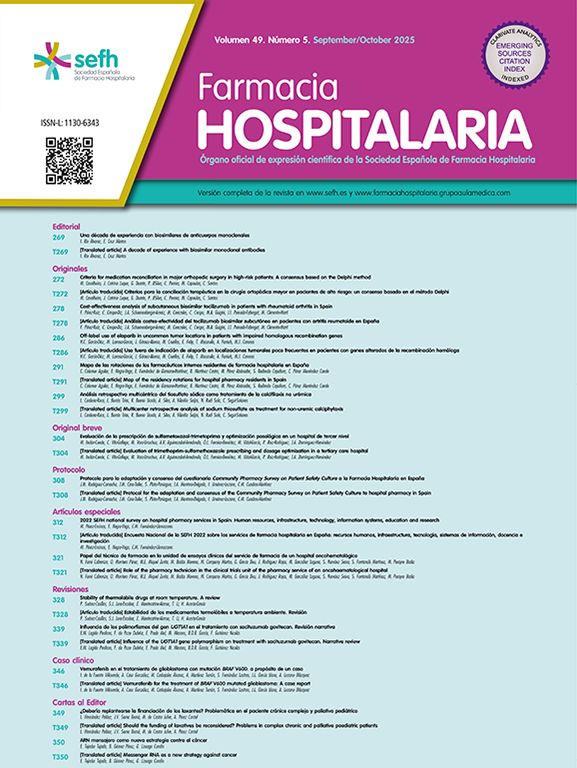Hypersensitivity reaction to abacavir (a powerful inverse transcriptase inhibitor) is a serious adverse effect that limits its use in antiretroviral treatment and requires a high level of clinical surveillance. Certain haplotypes of the primary histocompatibility complex proteins (HLA-B*5701) are very significant predictors of the risk of hypersensitivity to this drug. The purpose of this study is to identify the cases where a probable hypersensitivity reaction to abacavir presented the HLA-B*5701 allele.
MethodA retrospective study was conducted in all HIV-1 positive adult patients infected treated with abacavir between January 2000 and December 2007, in Department 6 of the Agencia Valenciana de Salud (Valencia Health Agency). The adverse effects developed by the patients were collected to determine which cases presented a probable clinically diagnosed hypersensitivity reaction. Finally, these 39 patients were screened for HLA-B*5701.
ResultsIn total, 323 patients were treated with abacavir between 2000 and 2007. The treatment was discontinued in 12.1% (n=39 patients) presenting a hypersensitivity reaction. Nine (23.1%) of these were HLA-B*5701 positive. Eight patients presented skin rash and positivity was observed in only single patient with gastrointestinal symptoms and fever.
ConclusionsThe administration of the HLA-B*5701 gene test may be of benefit in clinical practice, because it prevents diagnostic errors of the hypersensitivity reaction and enables more accurate interpretation of the symptoms.
La reacción de hipersensibilidad a abacavir (un potente inhibidor de la transcriptasa inversa) es un efecto adverso importante que limita su uso en la terapia antirretroviral y precisa un elevado grado de vigilancia clínica. Determinados haplotipos de las proteínas del complejo principal de histocompatibilidad (HLA-B*5701) predicen, de forma muy significativa, el riesgo de hipersensibilidad a este fármaco. El objetivo del estudio es identificar los casos que, después de desarrollar una probable reacción de hipersensibilidad a abacavir, presentaban el alelo HLA-B*5701.
MétodosSe ha realizado un estudio retrospectivo a todos los pacientes adultos infectados por el virus de la inmunodeficiencia humana 1 (VIH-1) que recibieron tratamiento con abacavir entre enero de 2000 y diciembre de 2007, en el Departamento 6 de la Agencia Valenciana de Salud. Se recogieron los efectos adversos desarrollados por los pacientes para identificar los casos con probable reacción de hipersensibilidad diagnosticada clínicamente. Finalmente, se realizó la tipificación de HLA-B*5701 a estos 39 pacientes.
ResultadosEn total, 323 pacientes recibieron tratamiento con abacavir entre 2000 y 2007. Se retiró el tratamiento por reacción de hipersensibilidad a 39 pacientes (12,1%); 9 (23,1%) de ellos resultaron HLA-B*5701 positivo; 8 pacientes manifestaron exantema y únicamente se observó positividad en un paciente con síntomas gastrointestinales y fiebre.
ConclusionesLa realización del test genético HLA-B*5701 podría ser favorable para la práctica clínica habitual, ya que evita errores en el diagnóstico de la reacción de hipersensibilidad y permite interpretar los síntomas con más seguridad.





